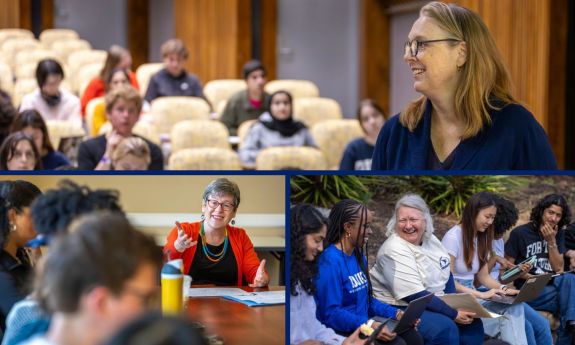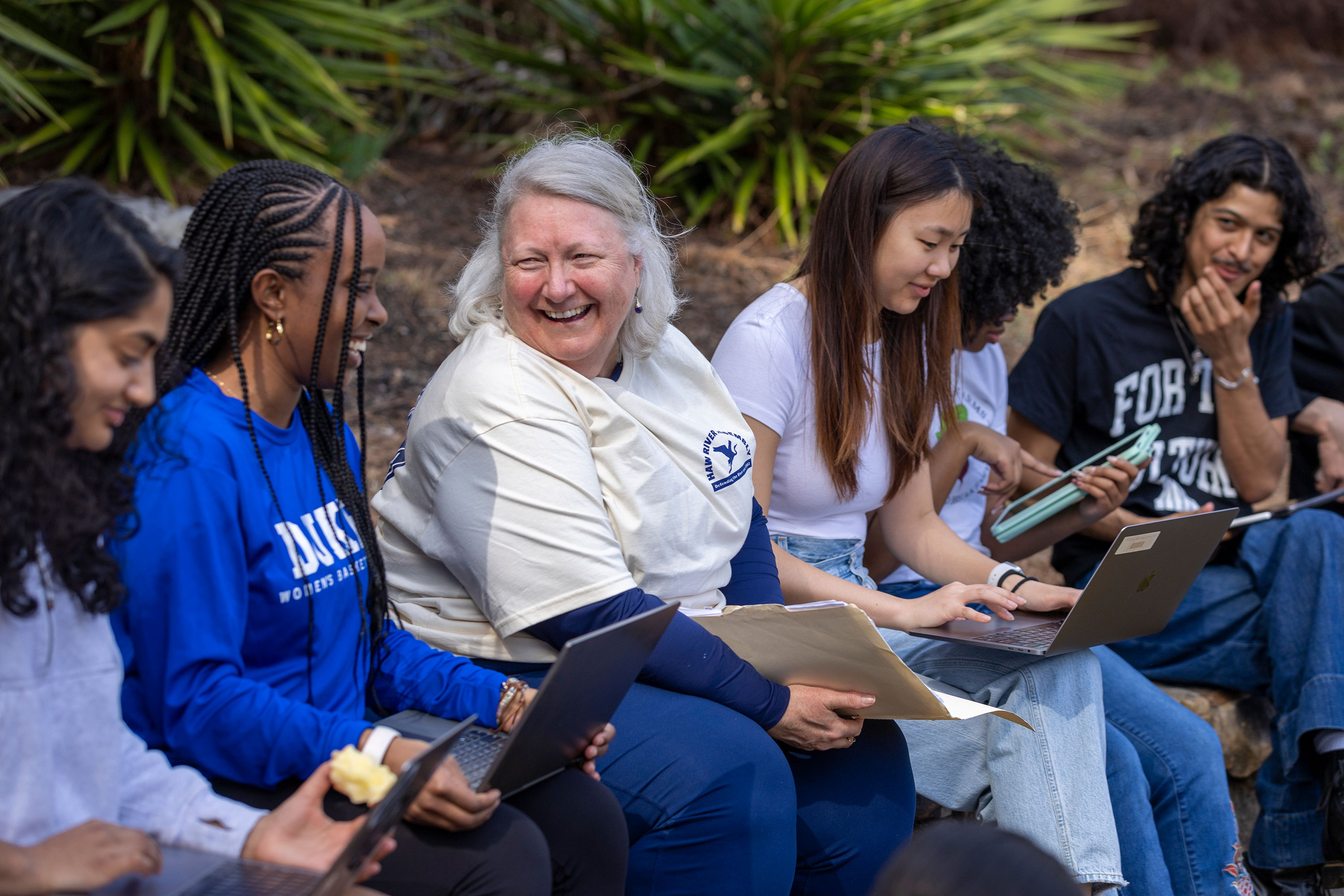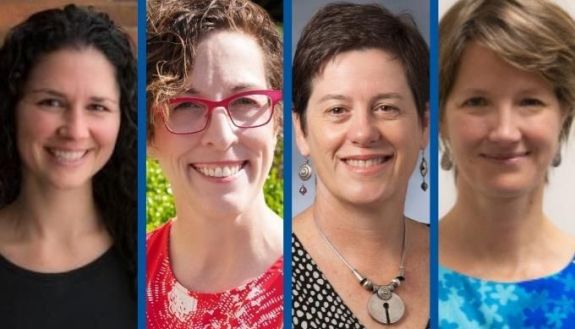Three Decker Award Winners on Engaging Students in Lifelong Learning
Admay, Canelas and Shapiro share their love of teaching

Duke University awarded its inaugural Judith Decker Prize for excellence in undergraduate teaching this year to three faculty members — Catherine Admay, Dorian Canelas and Karin Shapiro. The prize winners were chosen from 120 faculty candidates identified last spring during an open nomination period where Duke faculty, staff, alums and current students submitted more than 500 nominations.
Duke’s Office of Undergraduate Education enlisted student writers to interview professors Admay, Canelas and Shapiro for a take on their teaching philosophies.
Catherine Admay, Senior Lecturer, Sanford School of Public Policy
Interviewed by Courtney Lucius, Trinity Class of 2026

“Yay! Hi,” Catherine Admay said cheerfully as she rushed into a Sanford classroom to lead the “No Cash, No Care” workshop, a health and human rights court simulation organized to prepare students for careers in law, policy or related fields. She shook hands with each student, beaming as she greeted them. Admay created an immediate sense of welcome and connection.
This moment is emblematic of how Admay teaches — from a place of mutual engagement and shared purpose.
“I’m not a person who likes to be in the limelight. I like to teach and get us involved,” she said.
Her students say they are co-creators in an experience rooted in trust, intellectual curiosity, and what Admay calls “right relationship.” Her classroom is a space where ideas are tested, identities honored, and stories shared — to practice deep listening and empathy.
“This is why I love constitutional law — my heart,” she said, fluttering her hands over her heart. With energy, she draws connections between legal frameworks and lived experience, using role-plays to help students wrestle with justice in both theoretical and tangible terms.
A white South African who came of age under Apartheid, Admay’s teaching is animated by personal history and professional resolve. “How do we together un-make structural violence and bring about flourishing for all?” she asked.
For her, the classroom is not removed from the world’s challenges; it is a rehearsal space for justice, empathy and transformation. Whether helping students find their “sparkle” in legal doctrine or cheering them on beyond graduation, she teaches with unwavering joy, humility and a sense of shared responsibility.
Her students leave knowing that learning doesn’t end when class does — and that they’ve had a teacher who truly “held space for their greatness.”
Dorian Canelas, Associate Professor of the Practice of Chemistry, Trinity College of Arts and Science
Interviewed by Kit Shauf, Trinity Class of 2027

“Chemistry is not the most important thing you’re learning,” said Dorian Canelas. “You’re learning something transferable about pattern recognition. Or you’re learning to tackle a really difficult task and not give up. It’s not chemistry, but those are skills that will help you no matter what you do.”
Over the past 16 years Canelas has taught almost every undergraduate chemistry course. But even to Canelas, her pathway to her current career is quite the surprise.
“I never wanted to teach,” Canelas shared. “I wanted to work in industry.” Canelas earned her undergraduate degree in chemistry and then worked in research for four years before pursuing her Ph.D. After completing a postdoc, she returned to the private sector before receiving a call from a friend to apply to an open teaching position at North Carolina State University. After launching her teaching career there, she landed a job at Duke in 2009.
Canelas believes her experience in the private sector may be part of the secret to her talent as a professor; she said that it helped build professional skills such as collaboration on teams, communication, leadership and working with diverse groups of people.
Still, when asked if she prefers research or teaching, Canelas answered, “I would choose teaching, because I feel that I can make a bigger impact. I have the option to impact the world by watching so many people become successful.”
Canelas’ advice to her undergraduate students: “It’s important to struggle because that’s how you grow. And you’re going to make a lot of mistakes, and it’s really important to get good at accepting the responsibility for your actions. That’s something a lot of people haven’t learned before they get to college.”
She emphasized the importance of intellectual curiosity and responsibility. “As a scientist, you’re going to fail a lot. There’s a lot of people at Duke whose entire story has been a success story. But the people who have really become leaders in their field are the people who are willing to wipe out.”
Karin Shapiro, Associate Professor of the Practice in the Department of African and African American Studies, Trinity College of Arts and Sciences
Interviewed by Nabrissa Badu, Trinity Class of 2026

Karin Shapiro’s path to teaching African & African American studies at Duke was not straightforward, as she navigated a range of interests and career paths on her way.
What is consistent is an eagerness to understand the world around her, in particular moving between the histories of South Africa and the United States to find deep connections and distinctions in their fraught racial relations, and a commitment to share this research with students and non-scholarly audiences.
As an undergraduate at the University of Witwatersrand, Shapiro grew up in the politically tense backdrop of Apartheid South Africa. For her post-undergraduate studies, Shapiro deferred her acceptance to study medicine in favor of a Fulbright Fellowship to pursue a history degree at Yale University with a focus on African-American studies.
A Duke faculty member for the past 25 years, Shapiro has influenced the lives of many students. Her students have won numerous awards for their research papers. She seeks to empower students to take responsibility for their learning process, interacting with young minds in a way that lets them know of their true potential and ability to excel.
“There’s much to enjoy about being a Duke faculty member – superb colleagues, top-notch students, a world-class library, never ending fascinating conversations, opportunities to teach in interesting ways and to pursue wide-ranging intellectual interests,” Shapiro said.
Shapiro embodies the spirit of scholarly mentorship; in the classroom she encourages students to employ knowledge and skills to explore difficult questions on race, religion and political strategies, creating a space where contentious topics are not shied away from but approached with evidence-based understandings.
The Decker’s prize is recognition of the lasting influence she has had on her students and the colleagues with whom she has connected. Shapiro’s advice for aspiring academics is simple: “Have fun, be rigorous and be bold. The work is serious, but the process is endlessly creative.”


